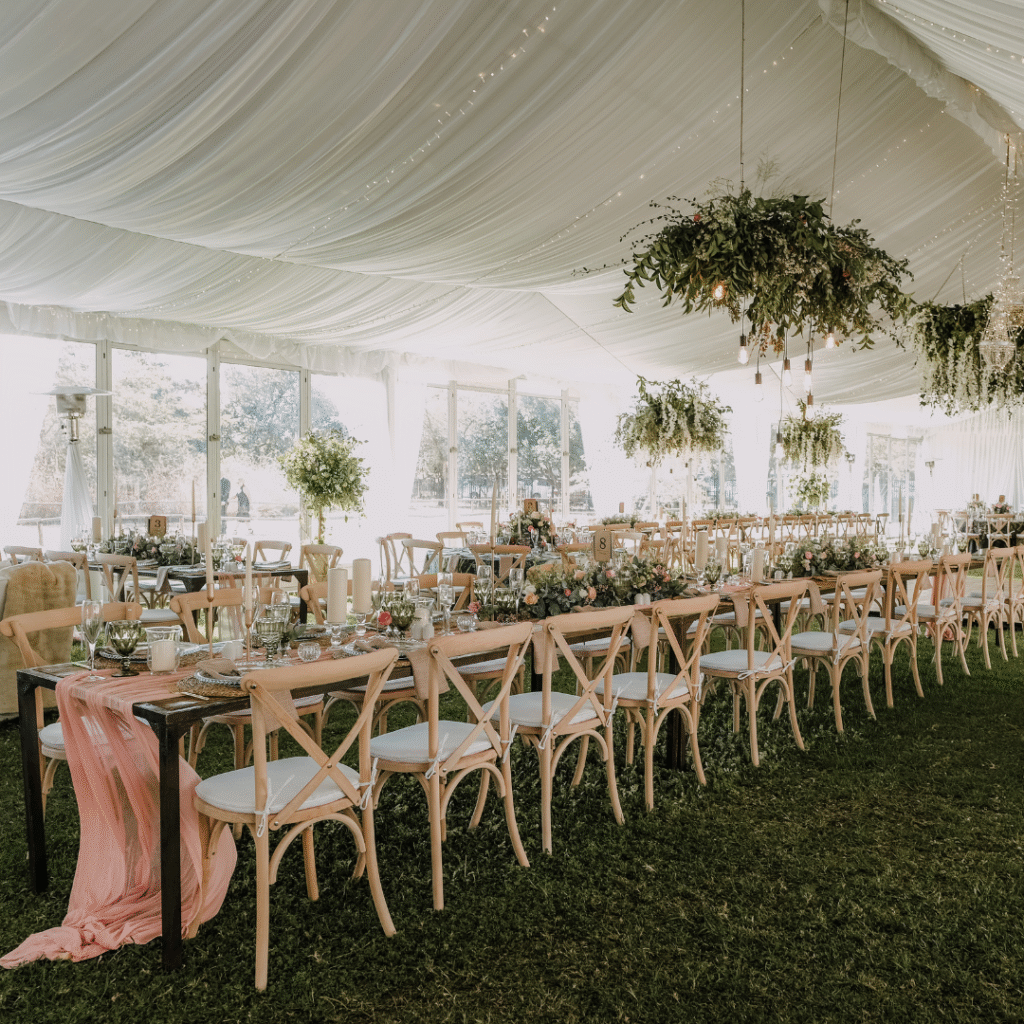Choosing between indoor and outdoor wedding venues can significantly impact the overall atmosphere of the celebration. Each option offers distinct advantages, and the right choice often depends on personal preferences and logistical considerations. Indoor venues provide a controlled environment, which can be ideal for those seeking reliability and comfort, while outdoor venues can create a stunning natural backdrop that adds a unique charm to the occasion.
Couples should consider factors such as weather, guest comfort, and desired aesthetics when making this decision. Outdoor weddings allow for beautiful scenery and fresh air, but they also come with uncertainties like unexpected weather changes. On the other hand, indoor venues typically offer more planning security and versatility in décor.
Ultimately, the decision hinges on the couple’s vision for their special day. They must balance their dream setting with practical elements to create a memorable experience for themselves and their guests.
Key Differences Between Indoor and Outdoor Wedding Venues
Choosing between indoor and outdoor wedding venues involves considering several key differences that can significantly influence the experience. These differences encompass atmosphere, logistics, and budget, each playing a critical role in the decision-making process.
Atmosphere and Style
Indoor weddings often provide a controlled environment with consistent lighting and temperature. Venues such as ballrooms or historic buildings can offer elegance and charm.
Decor can be customised extensively indoors, allowing for varied themes and styles.
Outdoor weddings, in contrast, benefit from natural landscapes and expansive scenery. They can embody a more relaxed and intimate vibe.
Elements like gardens, beaches, or rustic barns create unique backdrops. However, outdoor venues may require more decor to enhance the setting.
Venue Logistics and Flexibility
Indoor venues typically offer greater logistical control. Facilities include restrooms, catering kitchens, and often furniture, which makes it easier to coordinate vendors and guest needs. When planning in specific cities, it’s helpful to consult local listings of function venues Sydney (or elsewhere) to compare amenities and availability. This aids in smoother planning and execution for weddings and receptions.
Furthermore, indoor locations are less affected by weather. Couples can count on a stable venue regardless of external conditions.
Outdoor venues, while scenic, can present challenges. The weather can be unpredictable, necessitating contingency plans.
Space might be limited for amenities such as bathrooms or power sources. Couples should consider accessibility and comfort for guests when deciding on an outdoor setting.
Budget Considerations
Budget implications can vary significantly between indoor and outdoor venues. Indoor venues may have higher rental fees due to the facilities provided.
They may also include additional services such as staff and catering. Couples should factor in all costs associated with indoor locations.
Outdoor venues can often be more affordable. However, couples need to consider costs for tents, additional lighting, and rental furniture.
Permits and insurance may also add to the expenses. It is essential for couples to evaluate all financial aspects to determine the best fit for their wedding budget.
Advantages of Outdoor Wedding Venues
Outdoor wedding venues offer unique benefits that can enhance the overall experience. Their natural settings, abundant light, and flexibility can create memorable occasions tailored to individual preferences. Key aspects such as scenic beauty, lighting, and versatility play a significant role in their appeal.
Scenic Natural Beauty
Outdoor weddings often feature breathtaking backdrops, such as lush gardens, picturesque beaches, or rustic woodlands. This natural beauty enhances the overall aesthetic and provides stunning photographic opportunities. Couples can choose locations that align with their vision, whether it’s a romantic gazebo or an expansive meadow filled with wildflowers.
Additionally, the changing seasons can provide different atmospheres year-round. Spring blossoms, summer blooms, autumn leaves, or winter landscapes can all serve as ideal settings. These elements add an authentic touch, allowing each wedding to feel unique and personal.
Lighting and Ambience
Natural light is a significant advantage of outdoor venues. The soft glow of sunlight during the day can create an inviting and warm atmosphere. It allows for beautiful, candid photography that captures genuine emotions. For evening events, couples can enhance the ambience with string lights, lanterns, or candles, adding charm and elegance to the setting.
The outdoor environment also offers a sense of freedom. There is no need to contend with the limitations of artificial lighting found in indoor venues. Open spaces allow for creative lighting arrangements that match the couple’s style, increasing the magic of the celebration.
Versatile Outdoor Spaces
Outdoor wedding venues typically offer flexibility regarding layout and design. Couples can adapt the space to suit their vision, whether they prefer an intimate gathering or a larger celebration. Different areas, such as gardens for the ceremony and patios for the reception, allow a seamless flow throughout the event.
This versatility extends to decor options, with natural elements often requiring fewer embellishments. Couples can enhance the venue with floral arrangements, archways, or rustic furniture while maintaining the inherent beauty of the surroundings. This adaptability makes outdoor venues an excellent choice for various themes and styles.
Ideal Settings for Outdoor Ceremonies
Outdoor ceremonies provide a distinctive atmosphere often associated with romance and connection to nature. Whether it’s exchanging vows beneath a blooming arch or amidst trees, the natural setting significantly enhances the emotional impact of the occasion.
Many couples choose outdoor venues specifically for the opportunity to integrate elements of nature into their ceremony. The sounds of chirping birds or rustling leaves can complement personal vows beautifully, creating a multi-sensory experience for guests. Having a celebrant guide the proceedings in such a setting can further cement the moment’s significance and charm.
Benefits of Indoor Wedding Venues
Indoor wedding venues offer numerous advantages that cater to different preferences and needs. They provide a controlled environment that allows couples to focus on their vision without worrying about external factors. Below are some key benefits of choosing indoor venues.
Weatherproof Celebrations
One of the most significant benefits of indoor venues is their ability to provide a weatherproof environment. Rain, wind, and extreme temperatures can disrupt outdoor ceremonies. Indoor spaces ensure that a ceremony can proceed without interruption.
Couples can plan their weddings with peace of mind, knowing that they won’t have to deal with last-minute changes. Venue options such as banquet halls or church weddings are well-equipped to handle guest comfort regardless of outside conditions. With adequate heating or air conditioning, the atmosphere remains pleasant for everyone.
Customisable Lighting and Décor
Indoor venues allow for extensive customisation, particularly regarding lighting and décor. Couples can enhance the atmosphere through tailored lighting options, creating a desirable ambience for both the ceremony and reception.
Many venues come equipped with advanced lighting systems that can create the perfect mood, from romantic to festive. Couples can choose from various themes and colour schemes, ensuring that the setting reflects their personal style. This flexibility can complement everything from a casual wedding breakfast to a formal indoor ball.
Convenient Facilities and Services
Indoor venues often come with convenient facilities and services that simplify wedding planning. Amenities such as restrooms, kitchen services, and parking make logistics easier for both couples and their guests.
Many venues also offer catering services, including the ability to host a wedding breakfast, which can streamline the planning process. Additionally, having everything in one location reduces the need for travel between different sites. Couples can enjoy a seamless experience, allowing them to focus on enjoying their special day.
How to Choose the Right Venue for Your Wedding Day
Selecting the ideal venue for a wedding requires careful consideration of several factors. Key elements include the season and weather conditions, guest experience and accessibility, and collaboration with a wedding planner. Each factor can significantly influence the overall success of the event.
Seasonal and Weather Considerations
When deciding between indoor and outdoor venues, seasonal factors play a crucial role. Outdoor weddings depend heavily on weather conditions, which can be unpredictable. Couples should consider the average temperature and likelihood of rain for their chosen season.
For instance, a summer wedding may invite the risk of heat, while winter can bring freezing temperatures or snow. It’s advisable to have a backup plan if the chosen venue is outdoors. An indoor option or a tent can help manage these uncertainties.
Key points to consider:
- Research average weather conditions for the time of year.
- Establish contingency plans for unexpected weather changes.
Guest Experience and Accessibility
The guests’ experience is paramount when choosing a venue. Accessibility should cater to everyone, including those with mobility challenges. An indoor venue might provide controlled access and facilities such as elevators and ramps.
Consider the location’s proximity to accommodations. A venue situated away from lodgings may inconvenience guests. Additionally, parking availability and ease of navigation can significantly impact guest enjoyment.
Checklist for guest accessibility:
- Provide clear directions and signage.
- Ensure sufficient parking space.
- Offer amenities for guests with disabilities.
Working With Your Wedding Planner
A wedding planners nashville or elsewhere, can bring valuable expertise to the venue selection process. With extensive experience across a variety of locations, planners understand which venues align best with different styles, guest sizes, and budgets.
Effective collaboration involves clearly outlining the couple’s vision, priorities, and budget, enabling the planner to provide tailored recommendations and negotiate contracts that address all essential details, from catering to décor.
Considerations when working with a planner:
- Share specific design ideas and themes.
- Discuss budget constraints early in the process.
- Leverage their experience for venue recommendations.

